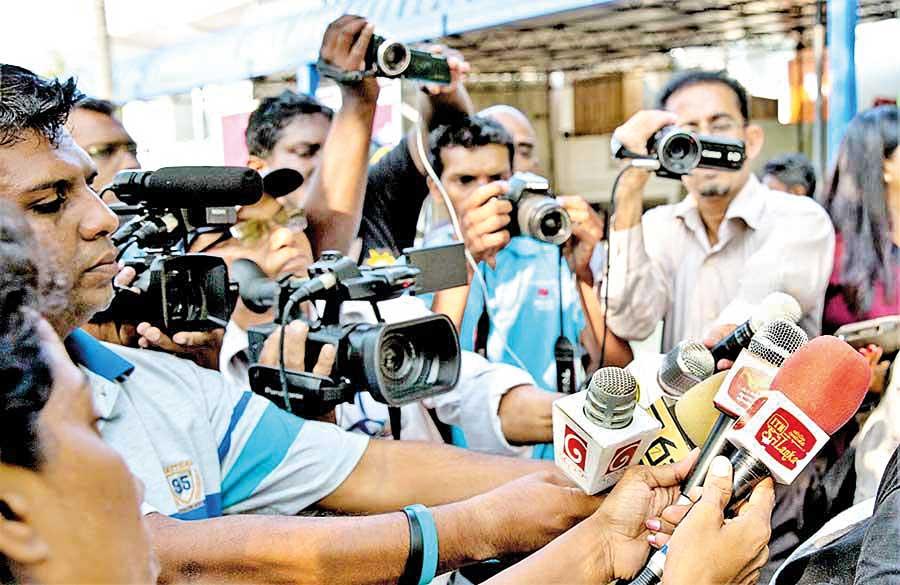Reply To:
Name - Reply Comment

Since the media industry is facing multiple existential issues, a good number of journalists desperately want a get-out of the country, seeking better prospects overseas, says the author

How do you reconcile yourself to leaving a calling? Is it betrayal? 
I fought with these sentiments when I first saw the Aragalaya protest wave take off in Sri Lanka last year. My initial thought was to return immediately. But I stopped going through with that decision. I knew that I would plunge right back into reporting for international outlets. I also knew for sure that I would only be reporting piecemeal chunks and could only do that till the international media attention was on Sri Lanka as a news story. I had been through this adrenaline driven Ferris wheel too often that I did not want to get on to it again.
I was sure that I did not want to return to a work cycle which left me frustrated and forced my move out of the country. Instead, I decided to do something that was very much counter-journalistic, I decided to wait. The wait was to understand the ground situation in Sri Lanka better and then make attempts to help my fellow colleagues.
The Sri Lanka journalism community was deeply scarred by historical trauma; the financial meltdown and the protests were placing most of my colleagues at the very edge of a precipice. They understood the dangers to their mental wellbeing their work created. Equally, they were aware that they did not have the skills to stave off those dangers
Mid-last year, the Dart Centre for Journalism and Trauma Asia Pacific, came up with the proposal to conduct a workshop on trauma informed journalism 101 for Sri Lankan journalists. As we went ahead with it, suspicions that me and my colleagues had, became confirmed. The Sri Lanka journalism community was deeply scarred by historical trauma, the financial meltdown and the protests were placing most of my colleagues at the very edge of a precipice. They understood the dangers to their mental wellbeing their work created. Equally, they were aware that they did not have the skills to stave off those dangers. This is where our work at the Dart Centre came in.
Following our first engagement with Sri Lankan journalists last September in Singapore, we also saw the dire need to take these skills to where they are needed most, to journalists working in Sinhala and Tamil.
This is how I ended up spending the anniversary week of the Mirihana Protests with colleagues who had reported on the protest’s firsts hand.
One young man who was among the very first to reach Galle Face Green protests site and stayed there till almost the last protester had left told me of the nightmares he suffers. How he still fears of being assaulted by military personnel.
Historically, the Sri Lankan journalism community has been very slow to acknowledge trauma impact. The residue still remains. Last year, when we were laying the groundwork for the workshops, there were a few instances when we heard the archaic refrain, ‘we don’t need this, we are tough’. Mostly from ‘seasoned seniors’
Another female colleague spoke of how difficult it was to take on the editorial responsibilities, make sure deadlines were met while also trying to act like the most stable person within the editorial.
In the North, colleagues spoke of repression that had seeped through like an evil mist. Wherever they went, it was now just next to their skin, a shrill chill making its presence clear.
Historically, the Sri Lankan journalism community has been very slow to acknowledge trauma impact. The residue still remains. Last year, when we were laying the groundwork for the workshops, there were a few instances when we heard the archaic refrain, ‘we don’t need this, we are tough’. Mostly from ‘seasoned’ seniors.
At least thankfully, a large number of younger journalists have broken away from that cast and are now not only willing to acknowledge the emotional labour of their work but also make sure they are safe.
Along with the historical reluctance to admit emotional harm, Sri Lanka has also been beset by the lack of a professional journalism training culture. We are always willing to accommodate half-baked overseas trainers and their plans without assessing whether these plans were suited for the context. Worse we are now hosting a growing community of quasi-experts with hardly any expertise on what most of them are doing. The worst of the lot are charlatans whose only claim to expertise is social media handles and handing out unfettered opinions.
Addressing emotional labour in journalism is a fraught issue even at the best of times. The unique Sri Lankan situation makes it even more delicate a balance.
Spending a week with journalists from across Sri Lanka made it very clear that the industry is facing multiple existential issues. A high number of journalists want a get-out ticket from the country desperately. Most of them are actively seeking out ways to seek better job prospects, mainly overseas. The level of institutional lethargy towards physical and psychosocial safety is morbidly high.
Along with the historical reluctance to admit emotional harm, Sri Lanka has also been beset by the lack of a professional journalism training culture. We are always willing to accommodate half-baked overseas trainers and their plans without assessing whether these plans were suited for the context
There is no letdown in the level of political influence and partisan reporting. A whole heap of start-ups has leveraged social media spread and access to popular personalities to create click-bait, marketing it as journalism. The only positive I saw and it was a big positive was that as a community, we are still willing to and capable of taking care of each other.
The Aragalaya has once again shown us how deeply scarred the Sri Lankan journalism community is. We have not taken the time to understand the chasms left by the 30 years of civil conflict. We should have. They are deeper and darker than ever before.
The show of outward bravado is a flimsy veil against the erosion of skills, trust and dedication within the industry.
No amount of followers, reposts, comments and soundbites will hide that you are a charlatan, they only amplify it.
The writer is a journalism researcher and the Project Lead at the Dart Centre Asia Pacific. He can be contacted on amantha.perera@cqumail.com
It is a body comprising companies such as Amazon, Apple, Booking.com, Expedia Group, Google, GoTo, Grab, LINE, LinkedIn, Meta, Rakuten, X and Yahoo.


